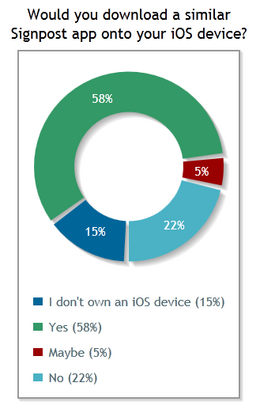Wikipedia:Wikipedia Signpost/2012-09-17/Technology report
Future-proofing: HTML5 and IPv6
1.20wmf12 deployments begin on time despite turbulent 1.20wmf11 series

1.20wmf12, the 12th release to Wikimedia wikis from the 1.20 branch, was deployed to its first wikis on September 17; if things go well, it will be deployed to all wikis by September 26. Its 200 or so changes – 111 to WMF-deployed extensions plus 98 to core MediaWiki code – include support for links with mixed-case protocols (e.g. Http://example.com) and the removal of the "No higher resolution available" message on the file description pages of SVG images.
Those responsible for overseeing this latest series of deployments to Wikimedia wikis will be hoping for a smoother ride with wmf12 than wmf11, which started its deployment cycle two weeks ago and has been causing problems ever since. First it was Wikimedia Commons, where bug #40018 (describing the duplication of the "This file is from Wikimedia Commons" page) forced a temporary reversion to wmf10 on September 5. Then it was a breakage in the "blue star" (watch) facility, reported as bug #40103 and which caused a reversion to wmf10 lasting some 40 hours.
The later bug (as well as other, more minor issues) stem from the decision to update the version of jQuery packaged with MediaWiki from 1.7.2 to 1.8. However, while some problems with LiquidThreads remain, both of the major issues have since been resolved, and as a result all Wikimedia wikis were running wmf11 in time for the wmf12 series to begin in earnest.
Despite these difficulties, this series of events may serve to demonstrate the robustness of the new regular deployment schedule: the disruption caused by the deploy–revert pattern undertaken with wmf11 (a package of some 250 changes) has been far less than for almost any problematic deployment under the previous release scheme, when thousands of revisions were deployed and reverted at the same time. But inevitably the completeness of the current JavaScript regression testing regime is likely to be questioned in light of the issues experienced.
In related news, work on a release from the 1.20 branch suitable for use on external wikis (whose system administrators often do not want the disruption of fortnightly updates) resulted in two beta-releases this week (wikitech-l mailing list). Former bugmeister Mark Hershberger has taken on the role of overseeing the creation of a release based on the 1.20wmf11 branch. It will now receive only a limited number of updates to avoid introducing new bugs, ensuring the emergence of a stable product suitable for general distribution. Hershberger, who is involved with one such external wiki, reported that he is targeting an early October release date for 1.20.
In brief
Not all fixes may have gone live to WMF sites at the time of writing; some may not be scheduled to go live for several weeks.
- HTML5 coming to wikis: As previewed in last week's "Technology report", HTML5 mode was enabled Wikimedia-wide on September 17. Overall, no immediate change to users' browsing or editing experience was expected – rather, the update was built to "future-proof" existing features and allow new ones (such as better video handling) to be developed – but small visual deficiencies were projected. As of the time of writing, only one problem has been reported – with text alignment in table cells. Any further problems can be reported on bugzilla.wikimedia.org (free registration required). HTML5 had already been successfully enabled on MediaWiki.org for some time on a trial basis.
- Wikimedia wikis face no issues as European IPv4 space runs out: As widely reported across the world, the RIPE NCC became the second of the world's five regional internet registries (RIRs) to enter the final phase of the global scheme for handling IPv4 exhaustion. RIPE, which covers Europe and parts of the Middle East and Central Asia, joins APNIC (the Australasian registry) in the final stage of version 4 IP address distribution, whereby consumers of the addresses (of the form xxx.xxx.xxx.xxx) will only be able to register 1024 more, suggesting web providers should be prepared for a boom in the usage of version 6 addresses. Fortunately, as we reported in June, MediaWiki is more or less able to handle IPv6 addresses properly, and it is enabled on all Wikimedia wikis, though some users may want to update their user scripts and/or tools to accommodate the newer addresses as more providers adopt them. Other remaining issues include presentational concerns as well as the lack of a functional "range contributions" tool to facilitate the calculation of rangeblocks. Statistics suggest that IPv6 addresses account for some 50 million Wikimedia pageview requests daily.
- Limn gains extra datasets, new developer: It was announced this week that Cornell graduate Dan Andreescu will be joining the Foundation's analytics team. Andreescu, a builder at heart, he says, will work on Limn, the WMF's new data visualisation and dashboard building toolkit, as well as a frontend for Kraken, its sister program focussing on data collation. Limn also surfaced this week as the chosen framework for a new Gerrit stats module; the module currently provides four time-series relating to code review via Gerrit). The Signpost hopes to publish its own investigation into the code-review backlog in the near future, responding to a request by WMF engineering community manager Sumana Harihareswara.
- Wikipedia Redesigned, revisited: Following the publication of a controversial "redesign" of Wikipedia's main interface by brand consultancy NewIsNew back in early August, one Wikimedian has now turned the design into a rough-and-ready gadget on the German Wikipedia. The gadget is likely to spur renewed interest in the design, which was criticised at the time for a lack of attention to internationalisation and multilingual issues – considerations that factor heavily in current MediaWiki thinking.




Discuss this story